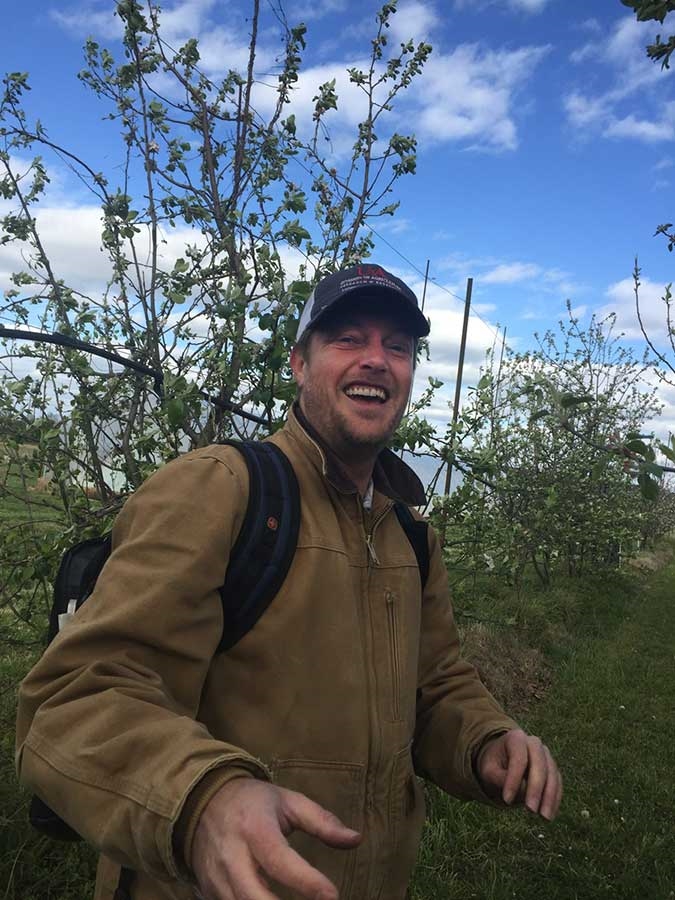
The Department of Entomology and Plant Pathology is hosting seminar speaker Stephen Robertson, a graduate student in Ashley Dowling's lab, today. The seminar is titled "Nocturnal Pollination in Fruit Agriculture."
The seminar takes place from 1-2 p.m. via Zoom link:
- Meeting link: http://tiny.cc/m47auz
- Meeting ID: 893 3546 9459
- Passcode: email enpl@uark.edu
The seminar is open to everyone.
Stephen describes the research:
"Insect pollination in agriculture provides as much as 35 percent of the global food supply and contributes hundreds of billions of dollars to the global economy each year. In the past 30 years, reports of declining populations of managed and wild bees, notably the western honey bee (Apis mellifera) and a wide array of bumble bees (Bombus spp.), have raised concerns about the stability and outlook of agriculture. At the same time, agricultural dependence on insect pollinators is increasing as greater percentages of land being converted to pollinator-dependent crops, such as soy and oil palm, than pollinator-independent crops, such as grains and oats.
"Current knowledge of animal-mediated pollination in agriculture is focused on diurnal pollinators, with particular attention given to bees. Nocturnal insects, especially moths, represent a significant source of pollinator diversity, even greater than that of all diurnal pollinators combined. They are also well-known for their pollination services outside of agriculture. As such, these insects could offer valuable pollination services to agriculture, potentially providing additional stability and security to production.
"I examined the roles of nocturnal-insect pollinators to fruit agriculture. The primary question was whether or not nocturnal pollinators offer any benefit to the production of selected fruits. I then examined which insects may be responsible for the observed pollination services. I found that nocturnal pollinators do not provide significant increases to the production peaches or muscadines. However, nocturnal pollinators significantly increased apple fruit set by comparison to a negative control, and nocturnal pollination levels were similar to those of diurnal pollinators. The most likely nocturnal pollinators were moths. These results are unprecedented and provide a new, potentially greatly underestimated, pollination system that demands immediate study."
About the Dale Bumpers College of Agricultural, Food and Life Sciences: Bumpers College provides life-changing opportunities to position and prepare graduates who will be leaders in the businesses associated with foods, family, the environment, agriculture, sustainability and human quality of life; and who will be first-choice candidates of employers looking for leaders, innovators, policy makers and entrepreneurs. The college is named for Dale Bumpers, former Arkansas governor and longtime U.S. senator who made the state prominent in national and international agriculture. For more information about Bumpers College, visit our website, and follow us on Twitter at @BumpersCollege and Instagram at BumpersCollege.
About the University of Arkansas: The University of Arkansas provides an internationally competitive education for undergraduate and graduate students in more than 200 academic programs. The university contributes new knowledge, economic development, basic and applied research, and creative activity while also providing service to academic and professional disciplines. The Carnegie Foundation classifies the University of Arkansas among fewer than 3% of colleges and universities in America that have the highest level of research activity. U.S. News & World Report ranks the U of A among its top American public research universities. Founded in 1871, the University of Arkansas comprises 10 colleges and schools and maintains a low student-to-faculty ratio that promotes personal attention and close mentoring.
Topics
Contacts
Ashley Roller, administrative specialist III
Department of Entomology and Plant Pathology
479-575-2445, ear007@uark.edu
Robby Edwards, director of communications
Bumpers College
479-575-4625, robbye@uark.edu